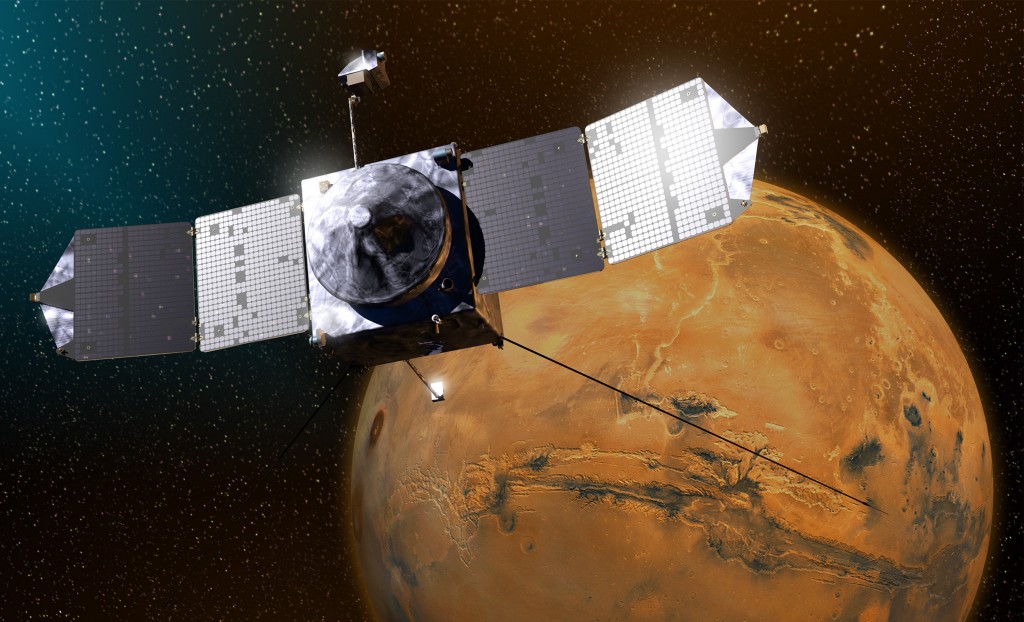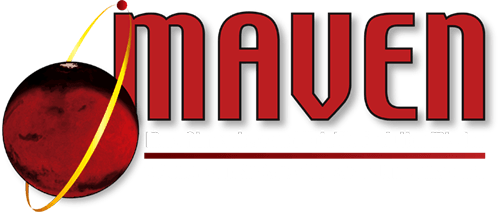Two Colorado high school students competed in regional and state science and engineering fairs with research they conducted using MAVEN mission data.
It was in their sophomore chemistry class that Allison (Ali) Inge and Langley Nakari first heard about the science research seminar their high school offers—and immediately knew they wanted to take it. Now, two years on, the two students have completed an impressive study of Mars’ atmosphere using data from the Mars Atmosphere and Volatile EvoultioN (MAVEN) mission and, in the process, won awards in both their regional and state science fairs.
“I was very nervous going into it, it was very daunting—I had never done anything like it before,” said Langley, when thinking back to the day of the regional fair. Ali agreed and explained what it was like: “we weren’t able to see other people’s projects, so we had no conceptualization of the standards of the other projects,” she said.” It was a complete surprise that we placed!
In March, Langley and Ali competed at the CordenPharma Regional Science Fair, where they placed 1st in the Earth and Space Science Senior Division and were one of three International Science and Engineering Fair (ISEF) winners, automatically qualifying them to compete at both the state and international fairs. They also received the ISEF Association for Women Geoscientists Special Award. Next, on April 7 they competed in the Colorado Science and Engineering fair, where they placed 2nd in the Earth and Space Science Senior Division and were awarded the Lockheed Martin Aerospace Award and the Department of Commerce (DOC), Boulder Laboratories Award for Excellence in Science and Engineering. The latter secured them internships at the DOC labs this summer in Boulder.
The students’ project, Characterizing the Altitude and Variability of the Martian Mesopause Over the MAVEN Mission, used data from MAVEN’s Extreme Ultraviolet Monitor (EUVM) instrument to study Mars’ mesopause, a narrow boundary that separates the Red Planet’s lower and upper atmospheric layers and is the coldest point in the Martian atmosphere. This region varies according to season, local time, and latitude, and is difficult to gather data from, and thus has not been well studied.
Using EUVM data, Ali and Langley determined the altitude and temperature of the mesopause and showed that it changes with season. This key result implies that what drives variability in Mars’ middle atmosphere changes significantly with season and provides evidence that Mars’ lower and upper atmosphere are coupled. The students’ research suggests that this connection may have influenced the evolution of the Mars atmosphere.
“Langley and I talked about our common interests, and it was a lot about space and physics, and Mars especially,” said Ali. Their teacher connected them to the Laboratory for Atmospheric and Space Physics (LASP) at the University of Colorado Boulder, which conducts a wide range of Mars research, and that’s where they met Ed Thiemann, a scientist for the MAVEN mission.
“Ali and Langley impressed upon me a motivation and determination that was exceptional,” said Thiemann. “They worked together as a team to figure out issues when they were stuck, and they progressed from simply taking analysis results at face value to questioning whether they made sense—a crucial habit in science and engineering.”
In addition to obtaining the scientific results, Ali and Langley learned quite a bit from their research experience, including time management and what’s involved in conducting professional research. “What struck me is how in our regular classes, we work on problems that have known solutions, so it’s really easy to go through and check your answer,” said Ali. “But with research, there was no way to know if we were doing it right because no one had looked at the data or investigated it before!”
“What Ali and Langley have accomplished is very impressive,” said MAVEN Principal Investigator Shannon Curry. “With Ed’s exceptional guidance, they have contributed unique scientific findings about the Martian atmosphere, and these findings will be a focus of future research for members of the MAVEN science team.”
Both Ali and Langley will graduate this spring from Monarch High School in Louisville, Colo., and plan to attend college in the fall. “This project really helped me realize that I want to do something in the future that involves research,” said Langley, who added, “I loved the feeling of finding something out and discovering new information.”
Ali and Langley will be competing again in the Regeneron International Science and Engineering Fair on May 7-13in Atlanta, Georgia.
Written by Willow Reed – MAVEN Communication Specialist


